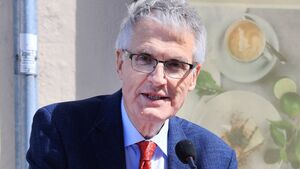View from the Green Room: Back in time - Broderick's Waterford lunchtime lectures

Eugene Broderick, Waterford’s genial historian, began his voyage around all things political, that revolved around the foundation of the State back in 1915, a decade ago.
The lunchtime Broderick lectures are back. Eugene Broderick, Waterford’s genial historian, began his voyage around all things political, that revolved around the foundation of the State back in 1915, a decade ago and here we are today discussing Albert Reynolds’ tenure in the Taoiseach’s chair.
There’s a real feeling of bonhomie in the garden room in the Medieval Museum. There are people here since the lectures began and everyone seems to be on nodding terms at the very least. Retirees love recently current topics that they have lived through and lunchtime breakers are avid fans of contemporary history.
In fact, there’s something in these lectures for everyone and Broderick’s charm and innate good humour makes for an interesting lunchtime hour or so.
I’ve always had a soft spot for Reynolds. Ever since he gave me a house telephone. When he became Minister for Posts and Telegraphs, the C&W Minister from Roosky, Co. Roscommon, set about modernising the telephone system and convinced the cabinet to invest £1 billion in the scheme.
Broderick’s audience laugh when phone boxes with Buttons A & B and ill-tempered telephonists, who thought they were doing their customers a favour, flash on his overheads. Within a decade, every house that wanted a phone had one and we had an electronic system that would have been the envy of any country.
Albert was a doer. He believed in getting things done and his civil servants respected and valued him. He brought a business acumen to his work as a minister – Posts & Telegraph…Industry and Commerce…Finance – that came naturally to him from his business dealings.
And he started many businesses. He made millions from his fleet of ballrooms and sold them at the top of the market before they went into decline. His C & D pet-food company, a bacon factory and a hire-purchase company made him independently wealthy.
He was naturally attracted to politics and – despite the condescension of the D4 political set towards the C&W minister – was ambitious to achieve things. His natural association with CJ Haughey as a kindred spirit saw them make common purpose as Haughey appointed him to a number of ministries.
Haughey owed much to Albert. He defended him in the famous heaves and championed his cause despite failing to win an overall majority in elections.
Despite his distaste at the proposed coalition with the PDs, Reynolds negotiated with them to bring about the alliance for government. Unfortunately, Charlie went behind Albert’s back and conducted his own private negotiations with the PD leader. Albert never really forgave him. What Albert called “a temporary little arrangement with the PDs” imploded less than 30 months after he became Taoiseach.
Albert died in 2014. He was the only Taoiseach to employ workers and he did it, largely, in rural Ireland. The lunchtime lectures series continues on Wednesdays at 1pm in the Medieval Museum.






